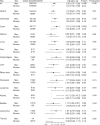Association between C-reactive protein and risk of overall and 18 site-specific cancers in a Japanese case-cohort
- PMID: 35140343
- PMCID: PMC9091208
- DOI: 10.1038/s41416-022-01715-8
Association between C-reactive protein and risk of overall and 18 site-specific cancers in a Japanese case-cohort
Abstract
Background: Evidence of the association between chronic low-grade inflammation, as reflected by C-reactive protein (CRP) measurements, and cancer risk is equivocal. Specifically, few studies have examined this in uncommon cancers and Asian populations.
Methods: We utilised a case-cohort design consisting of multi-types of cancer (N = 3608), and a random subcohort (N = 4432) in a Japanese large population-based study, with a median follow-up time of 15.6 years, and measured baseline plasma CRP using high sensitivity assay. The hazard ratios (HRs) were estimated using weighted Cox proportional hazards methods.
Results: The multivariable-adjusted HR (95% confidence interval) for the top quartile of CRP was 1.28 (1.11‒1.48) (Ptrend < 0.001) for overall cancer compared to the bottom quartile of CRP. Among site-specific cancers, higher CRP levels were associated with an increased risk of colorectal, lung, breast, biliary tract, and kidney cancer, and leukaemia. These positive associations remained among participants after >3 years' follow-up. Furthermore, subgroup analyses for overall cancer robustly showed a positive association with CRP levels, regardless of sex and obesity.
Conclusion: Our consistent findings suggested that chronic low-grade inflammation measured by CRP is associated with the risk of cancer.
© 2022. The Author(s), under exclusive licence to Springer Nature Limited.
Conflict of interest statement
The authors declare no competing interests.
Figures

References
Publication types
MeSH terms
Substances
LinkOut - more resources
Full Text Sources
Medical
Research Materials
Miscellaneous

